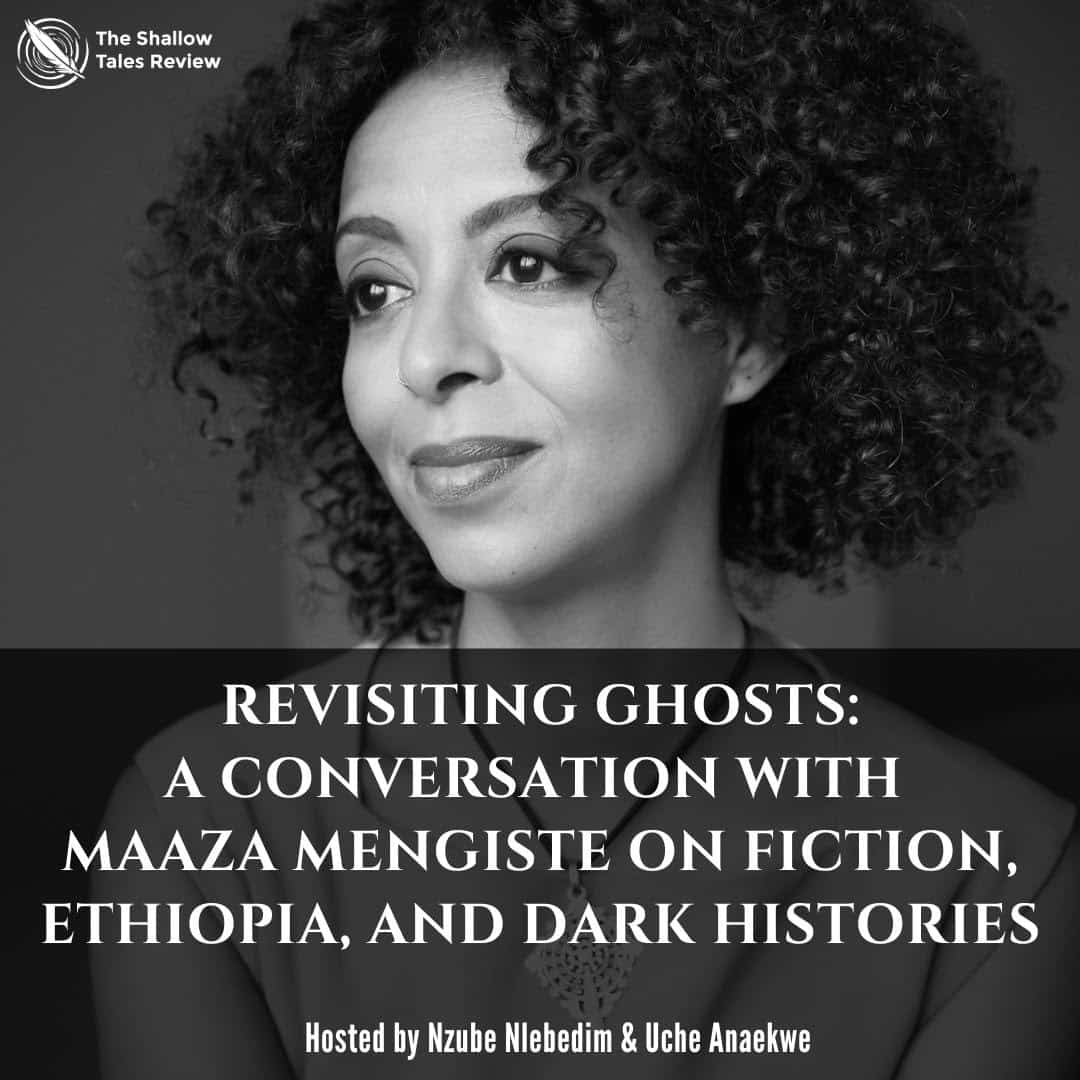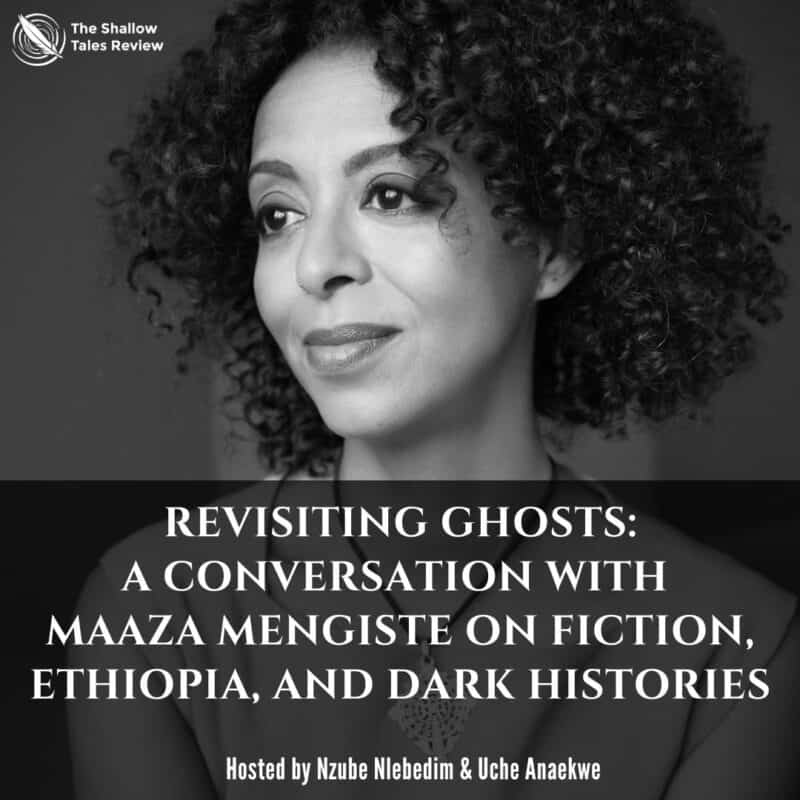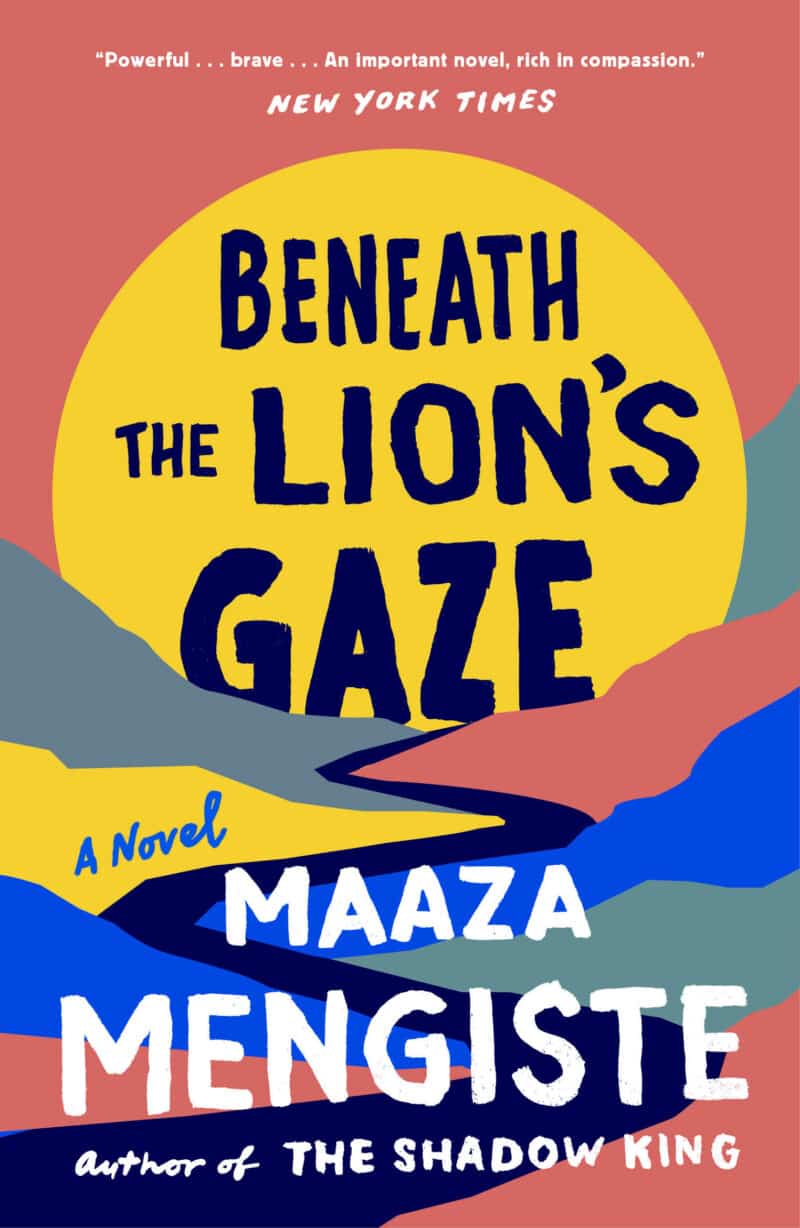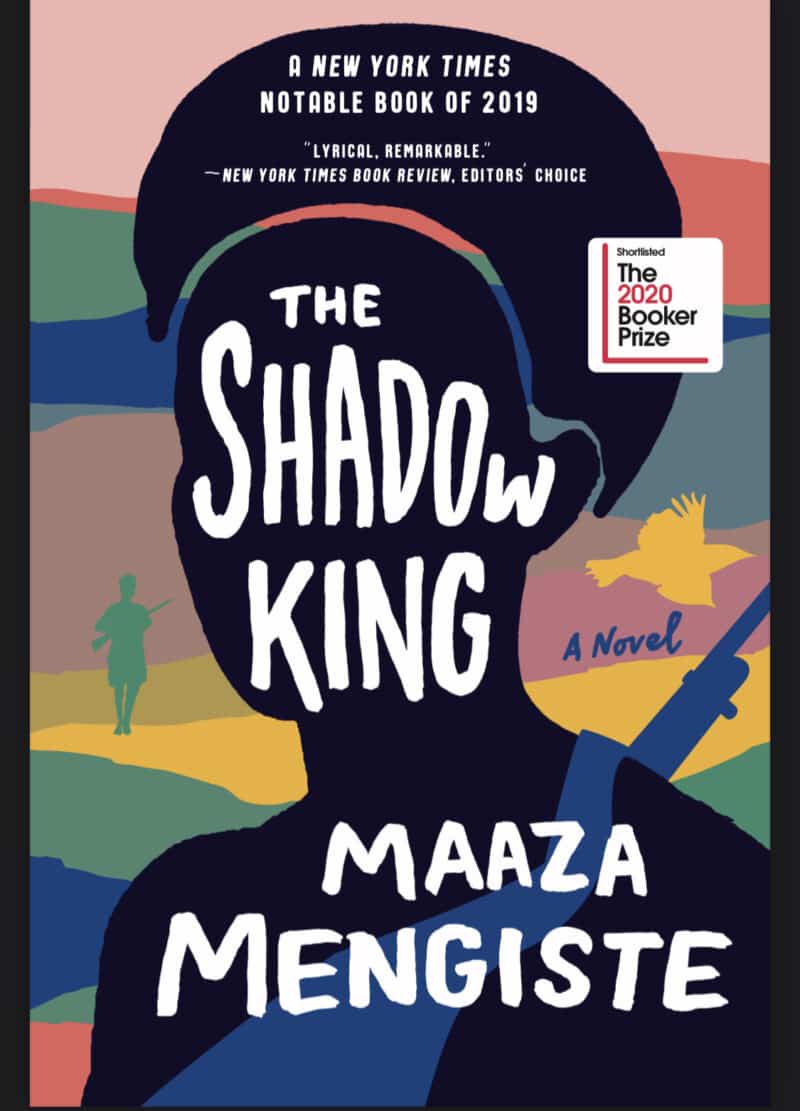Maaza Mengiste received a BA from the University of Michigan and an MFA from New York University. A novelist, essayist, and photographer, she is the author of the novel, The Shadow King, which was shortlisted for the 2020 Booker Prize, and was a 2020 LA Times Book Prize Fiction finalist. It was named best book of the year by the New York Times, NPR, Elle, Time, and more. Her debut novel, Beneath the Lion’s Gaze, was selected by the Guardian as one of the 10 best contemporary African books and named one of the best books of 2010 by Christian Science Monitor, Boston Globe, and other publications. Her story, “Dust, Ash, Flight,” which appeared in Addis Ababa Noir, edited by Maaza, was awarded a 2021 Edgar Award for Best Short Story.
She is the recipient of a Guggenheim Fellowship, an American Academy of Arts and Letters Award in Literature, a DAAD Artists-in-Berlin Fellowship, a Cullman Center for Scholars and Writers Fellowship, the Premio von Rezzori, the Premio il ponte, a Fulbright Fellowship, a National Endowment for the Arts Award, and a Creative Capital Award. Her work can be found in The New Yorker, The New York Review of Books, Granta, the Guardian, The New York Times, Esquire, Rolling Stone, and BBC, among other places.
She has taught at New York University, Princeton University, Northwestern University, and Queens College/CUNY. She is on the board of Words Without Borders and Warscapes. She lives in New York City and is at work on her third novel.
You were three years old at the onset of the 1974 Ethiopian Revolution which saw the toppling of Haile Selassie’s government, and his eventual ousting. Your parents left Ethiopia during the Ethiopian Civil War, too. Your two novels reflect aspects of these crises. Beneath the Lion’s Gaze foregrounds the Revolution. Historical fiction is generally known to show the fear, the disillusionment and alienation on all affected by it, directly or not. What has been the inspiration of your work in relation to the vast complexity of history? Why centre history?
The memories I had as a child were influential in my decision to centre history in my writing. Since I have these memories of the Revolution, and because I did not understand what I was experiencing, I could not fathom what it meant for a country to be in a civil war. I didn’t know why soldiers were outside, for example. I could not understand their seemingly sudden appearance in our lives. That experience influenced my later interest in Ethiopian history. I was trying to answer, in adulthood, the questions I asked when I was a child. Those answers led me to more interesting history, to considering writing a book with some of the memories that I had, as well as some of the answers I was finding about this Revolution. The centering of history in my life began therefore when I was a child; when history, in a sense, happened to me through the Revolution.
There are more vibrant, growing conversations today about the place of African women in literature, both as creators and characters. The Frankfurt Book Fair’s decision on Adania Shibli, as a more recent case of note, has renewed the already stirred-up take on why women matter in literature, and how far we can fight for them to give them their deserving place. There is as much need today for writing women in African literature. You’ve focused women extensively in your work. How well do you think the narratives of women in conflict and war have been pushed in Ethiopian creative writing? Do you think there is enough work being put into this?
First, I must say that if you have not read Adania Shibli’s novel, Minor Detail, you should run to find it and read it. As for your question about African literature and women, we have very clear knowledge in Ethiopia and across Africa of women who have served traditional roles during conflict: women who have been nurses, women who have provided the food, women who have travelled with the military to provide aid in different ways. We know those traditional roles. However, when a woman moves into the less traditional role of a fighter, we do not hear about it as much. And when we are told about these stories, we hear about the accounts of one woman or a few women. They are told as if they are isolated incidents. What we are not told is that there were so many of these women. The literature about this is growing all over the world. We can look at literature dating back thousands of years and we will find women soldiers, women who led nations. Yet, we keep forgetting about these women. And so, when someone writes about them, it feels new again. What African women writers are doing is writing fiction that once again centres women and puts them in their rightful place in African and world history.
Your 2019 novel, The Shadow King, was shortlisted for the Booker Prize in 2020. The book portrayed feminine power in its depiction of those Ethiopian women who helped to defend their country against Italian fascists during World War II. It becomes even more fascinating when we discover that your great-grandmother participated in this war. You told a deeply personal story, then, and were honoured for it. What did this Booker Prize shortlist do for you?
A Booker Prize nomination is a big boost to one’s career and book. I felt the impact of it in how many more people The Shadow King reached. This felt in great contrast to my first novel, Beneath the Lion’s Gaze. Suddenly, people were reading The Shadow King and were interested in the history, and if they were not before, they wanted to read more African literature in general. The shortlisting was both surprising and incredibly exhilarating. It created conversations for me with different groups of people who had their own memories of women in their family who fought in different conflicts. It was wonderful talking to people whose mothers, grandmothers or great-grandmothers, for instance, were part of anti-colonial movements and revolutions.
You are one of a few contemporary Ethiopian writers. In terms of numbers, popular contemporary Ethiopian writing, especially fiction, has not had a strong presence when we speak of African literature. Is there truly a gap needing filling?
There are many gaps and still so much room to be filled. Ethiopian history is so vast and long. We have more than 200 languages that are spoken in the country. We have three main languages: Amharic, Tigrinya, and Afaan Oromo. We need literature in all of these languages to become more widely available. We need more writing from the diaspora as well, which can speak to another distinct Ethiopian experience. Ethiopia has a history of people who write, they have been mostly men. The field is growing, however, and I’m excited. There are new writers such as Mihret Sibhat, Rebecca Fisseha, Maya Beniam, Mahlet Shifferaw, Mikael Awake, and of course, the legendary Dinaw Mengestu. All of them are telling their own stories in their own ways.
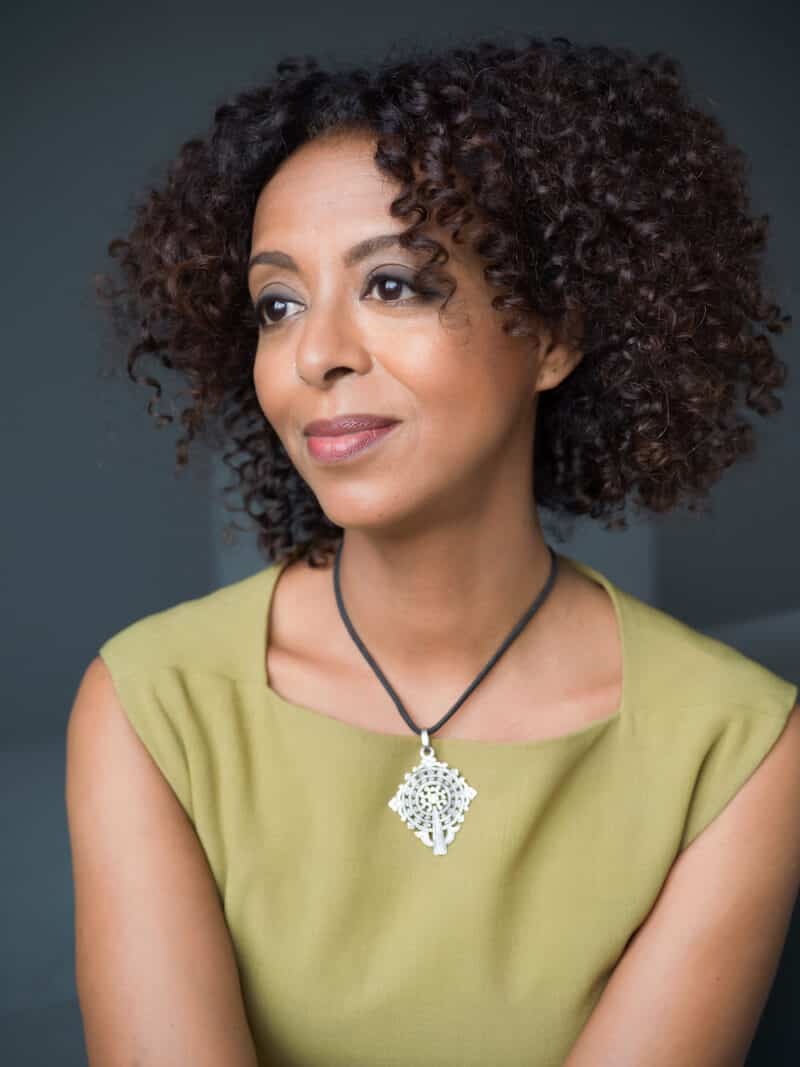
Your Ethiopian ancestry provides you with a certain historical outlook. Ethiopia has its roots dating over four million years. You’re steeped, then, in a profoundly rich tradition and culture. Still, history carries its own share of sorrow, its own share of memories of conflicts and traumas. I am concerned about the mind here. Where does healing and closure come into play in your writing, and how much of this healing is necessary?
As we speak, Ethiopia is in the midst of an ethnic cleansing. We know the devastations in the Tigray region and those that are in Amhara, Oromiya, and Afar. One of my characters asks in The Shadow King, “What war ever really ends?” Every war is fought on the memory of another; perhaps on the memory of many others. How do we move out of that and create a path for peace? In Ethiopia, there is no healing yet. There has been no lasting peace because there must first be justice. What does justice look like? That is the question that no single novelist can answer, but I believe the role of literature is to remind people of those who suffer, and hope, and resist. We write in order to warn against the next time.
Having experienced something similar, what experiences does the Israel-Palestine conflict bring up for you?
I keep thinking that the pain we are witnessing now in Gaza and the West Bank, the pain of those Israeli families who are mourning their loved ones, is set against a particular narrative that is different from my own experiences. The massacres that are unfolding in Gaza and the murders in the West Bank began long before 7th of October. I look at the children affected, and I wonder how they can overcome those types of memories. Mine are nothing compared to what they have experienced. Even in my small glimpses of the Ethiopian Revolution, the memories will never leave me. How much more are children in Gaza and the West Bank suffering? How much more are they forced to remember? To try to understand? What we are watching now in Gaza is an attempt to completely destroy and exterminate not only the bodies of people, but also their minds, and their memories, and their histories. This is textbook genocide.
With your forthcoming book, A Brief Portrait of Small Deaths, we may now be fully confident in your fascination with history and the forgotten stories that rest within what we think we know. The Shadow King provides a different perspective of the Second Italo-Ethiopian War, for instance. You bring history, then, to the fore and reimagine it, panning your camera on lives that may have been otherwise neglected in mainstream cultural narratives. That’s an important task. What can you share about this new book?
I can tell you that I am diligently working on this new book with great enthusiasm and joy! Though writing has its frustrations, I have found the research and the whole writing process to be rewarding. It is a work of historical fiction, again. I can’t wait to be done so I can share it with you!
In your essay on The Irish Times, your words are important: “I have to see what is there without smoothing out the rough edges of history. It is too easy to put myself into the photograph and reach into the past to settle the pieces into some reassuring order.” I interpret your argument as concerning the often-forced historicisation of narratives, the reaching in for stories where they do not call out, and the rendering of history in second place before the actual story. We face literary and historical fiction, then, particularly as regards their utilitarian functions. Would you consider the former as being more effective in rendering narratives such as the ones you tell, as compared to your work with the latter?
One of the challenges of writing historical fiction comes in deciding what to do with historical documents that either lack certain details, or distort facts for the sake of erasing certain groups of people. What happens when the desire to write a particular truth about your character does not coincide with a historical fact? Do you choose the narrative, or do you choose history? I think fiction can tell a greater truth that history – with its biases and colonial erasures – cannot. I chose the truth of literature, but need to stay true to the historical moment. For example, I cannot make my female characters from 1935 behave as women do in 2023. The times were different, the social norms were different. I can’t make a woman offended about something in 1935 that she may not have noticed or cared so much about in 1935, especially during a war.
As for your question about historical fiction and other genres in fiction. I don’t know which is more effective in rendering narratives. I think they are both essential. I am more interested in writing that tackles difficult questions. This can feature in both historical and literary fiction. The division between both kinds of fiction often gets blurry. I can’t tell you what is one thing and what is another. They are all literature. I choose to write historical fiction because I am interested in what the past can tell us, but I find contemporary fiction powerful for the same reason
You mentioned in your 2020 Booker Prize interview: “I often said I wrote this book surrounded by ghosts. I could feel them rise up at certain moments, demanding their turn to speak, to become remembered, to be ushered into the rooms of the honoured.” It takes strength to give characters such deep agency when writing fiction. I quickly tweeted this quote the evening I came upon it. I found it beautiful. Have you been compelled to hide your characters away from the spotlight of hard, cruel history; to not in your words “will a narrative onto this picture” but will a picture firmly into the narrative?
I think that as writers we are doing our best work when we allow the story lead us, as opposed to trying to force it. However, I can understand when writers feel that a story should go a certain way. They want something to happen, and so they insist that it should happen in that way. Sometimes in the end, they get stuck because that’s not how the story is meant to be. I have had the urge to protect my characters from what I know happened to real people during those moments in history. Still, in the end, I have tried to depict what was the most accurate, as best as I could. In choosing to not protect my characters, in choosing to allow them to experience what real people experienced, readers will understand the lives of real human beings. In that way, I hope to have honoured people who have passed, those who were killed, the victims of the Revolution.
It is a cruel thing for a child to be confronted with so much by the country of their birth. You lost family during the Civil War. I return to my question on the place of healing. In Beneath the Lion’s Gaze, you depicted the terror that pervaded that point in history, of which you were part of. There are memories to relive, although not altogether easy ones to tell. There is also the desperate quest for closure. Still, you have gained roots in other places, including Nigeria. In everything, what place does Ethiopia hold? Is it an entirely fond one?
Of course, I have memories of the Revolution, but my happiest childhood memories are of Ethiopia. I was with my family who loved me, whom I loved, and who were trying to protect me from the Revolution. I look towards those moments with fondness. In the end, it is where we experience love that we imagine as home.
Are there any early memories of Ethiopia that may have necessitated your decision to write? What pressure point led you up to this point, and when did you decide you wanted to write?
I knew I liked to read, but I did not imagine I could be a writer since I never met any writer growing up. Writing was not what my parents encouraged. They thought I could become an engineer or a doctor. When I went to college, I did not take any creative writing classes, although I studied English literature and I loved it. It was not until many years after graduating college that I began to think about the stories I could tell about the Revolution. It was not a straightforward path for me. When I was in college, I read Our Sister Killjoy, by Ama Ata Aidoo. I found it revolutionary to read the story of a black woman, an immigrant like me, written so strikingly. I will never forget it. Aidoo was and still remains an important writer to me. There was Toni Morrison also, but Aidoo remains absolutely pivotal for me.
What would you consider the effect of the many places you have lived over the years, on your work? Has there been any impact — aesthetically and creatively speaking — away from Ethiopia?
I have always loved any chance to go to Africa. Is there a more beautiful part of the world? My travels around the globe have shown me that there is always someone somewhere who understands revolution or some kind of civil war or personal conflict in their home. Everyone has a story to share. This makes me realise that literature binds us together and creates a community, a different kind of country than the geography we are familiar with. Literature creates a world for readers, and I’m always happy to meet those people who talk to me, who invite me in their worlds and communities. Apart from Ethiopia, Nigeria holds a very special place for me. When I was in Nigeria, we lived in Ikeja, Lagos. I cannot answer the Jollof wars, but I have loved Nigerian Jollof (though Ghana’s is quite good, too!). I hope to visit again someday. And Kenya is also very special to me. I hope one day to return.
Nzube Nlebedim is a Nigerian writer, essayist, critic and editor. He is the founding editor of The Shallow Tales Review. His collection of personal essays on home, memory and time is set for UK release in 2024. He lives and works in Lagos, Nigeria.
Uche Anaekwe is a book reviewer and book editor. She reads and writes reviews of over a hundred books yearly and works closely with some publishing houses in Nigeria like Masobe and Narrative Landscape Press publishers to promote the best of African and Nigerian Literature. When she isn’t reading and sourcing for her next read, she spends her day flying around Nigeria as a flight attendant. She lives everywhere but has shelter in Lagos, Nigeria.

